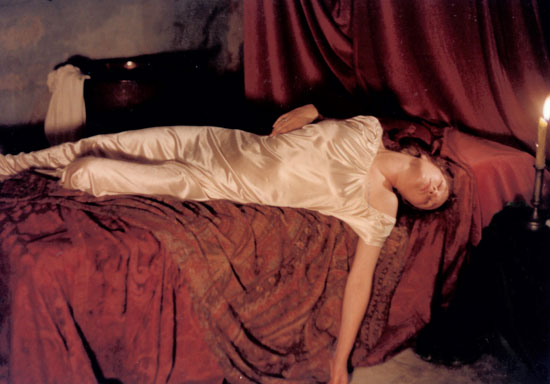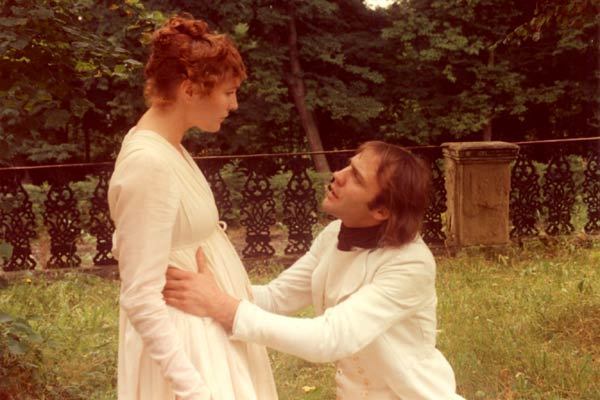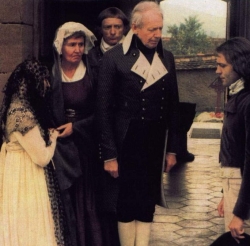Die Marquise Von O Film 1976
Die Marquise von O… (1976 review)
This review appeared in the Dec 1976 issue of Monthly Film Bulletin. For whatever it's worth, my favorite amongst Rohmer's features remains his most unjustly neglectedPerceval le Gallois (1978), the feature he made immediately subsequently this"tasteful" betrayal of von Kleist's Die Marquise von O… –J.R.

Marquise von O…, Die
West Deutschland/France, 1976
Director: Eric Rohmer
Probably the nigh faithful of all the disciples of André Bazin, Eric Rohmer has shared his mentor's philosophical fascination with "ambiguity" in his criticism and films alike. A position derived from Catholic existentialism which adheres to a "realist" aesthetic whose prime model is the naturalistic novel as exemplified by Dos Passos, Hemingway and Hammett, this orientation is conspicuously at the root of his version of Kleist's masterpiece, which subtly betrays the awesome energies of the original while maintaining an overall fidelity to its plot and characters that is rare in contemporary movie theater. Widely and justifiably praised for its immaculate direction, acting, and visual composure, it can none the less be regarded as a Jamesian re-write of the novellas that dims the passion of the latter with a form of delicate detachment quite in keeping with the tenor of Rohmer's Contes Moraux. A pocket-sized omission similar the very Kleistian blood "gushing" from the mouth of a would-be rapist whom the Count "smashes" in the face with the hilt of his sword — a particular which the film tastefully keeps off-screen -– reveals this strategy on a rather piddling level; and the splitting in half of the Count's childhood anecdote about the swan of which he is reminded by the Marquise -– so that its conclusion now comes at the end of the plot -– tin hands be defended as a sensible dramatic expedient. But Rohmer's virtual transference of the Marquise'south unseen rape from the scene of battle to her father's château (basically a thing of stylistic emphasis) and the commutation of a sleeping potion for a fainting spell to motivate her unconsciousness are much more consequential; as Pauline Kael has observed, these and related cosmetic "improvements" big deprive the plot of "Kleist'due south spirit, which made him an avant-gardist and a modernistic -– his credence of the id released by the anarchy of war". In a manner recalling the Hitchcock of The Wrong Homo, Rohmer fifty-fifty includes a couple of close-ups of the Count and the retainer Leopardo, each gazing at the sleeping Marquise just before her rape, in lodge to reinforce an ambivalence about the latter which Kleist only introduces (and quickly dispels) towards the end of the story. More by and large, the Count himself is tamed somewhat in Rohmer's treatment from a crazed compulsive character to a relatively charming eccentric. Absolutely, questions of nuance are a highly subjective matter, and theoretically i tin can grant that whatever sort of alternations are permissible. What one regrets nigh this highly tactful and covert class of expose is that it masks an attitude towards adaptation which is itself quite debatable. Starting from the premise that linguistic communication is transparent — an essential part of Bazin's legacy — Rohmer is brought quite logically to the operating principle that Kleist's novella is "adaptable" only considering its bones components are the imaginary constructs perceived through its language (plot, settings, characters, events, themes, etc.) An attitude that differs from Joseph Strick's in "adapting" Ulysees more in degree than in primary assumptions, information technology leads one to the bibelot of accepting a Marquise von O… without Kleist, and a Rohmer without a tale of his own to tell. In one case one accepts this anomaly, all difficulties vanish, and Dice Marquise von O… immediately qualifies every bit one of the most elegant flick objects since Stavisky… There are many things to marvel at: the painterly compositions (beautifully shot by Nestor Almendros, with deportment oftentimes charted forth diagonal paths which evoke the director'south long-term interest in Murnau's Faust), the gentle eroticism and emotional charge of Edith Clever as the Marquise (who figures to all-time advantage in her two long scenes with the every bit impressive Edda Seippel, playing her mother), the ingenious blocking out and compression of the concrete activity itself. Cheers to such mastery, viewers who don't have an opportunity to read Kleist'due south extraordinary novella — which is not easily available in English — won't even be able to imagine what they're missing.
—Monthly Film Bulletin, Dec 1976 (vol. 43, no. 515)



Source: https://jonathanrosenbaum.net/2021/04/die-marquise-von-o/
Posted by: cookwhisente.blogspot.com

0 Response to "Die Marquise Von O Film 1976"
Post a Comment